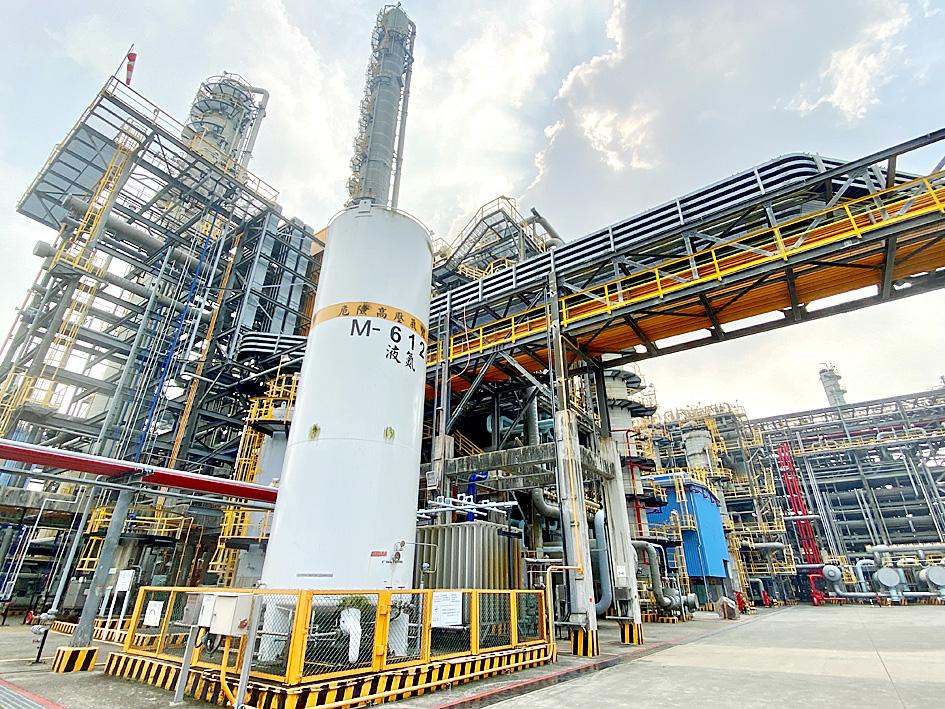As crude oil prices rise sharply this year due to the war in Ukraine, the value of Taiwan’s oil imports surged by 75.6 percent to US$11.9 billion in the first five months of this year compared with the same period last year, the Ministry of Finance said in a report on Thursday.
The import value is expected to reach from US$28 billion to NT$31 billion by the end of the year, the highest in eight years, the ministry said.
Taiwan is almost entirely dependent on imports for its oil supply, the ministry said, adding that the import volume was stable from 2012 to 2019, at above 300 million barrels a year, while the import value fluctuated with changes in international oil prices.

Photo: Hung Chen-hung, Taipei Times
Taiwan last year imported 282.88 million barrels of oil, up 6.6 percent from a year earlier, while the import value rose 59 percent to US$19.9 billion, as the reopening of major economies boosted crude oil prices, the ministry said.
That was in contrast to 2020, when the nation imported 265.26 million barrels of oil, down 18 percent from a year earlier, while the import value plunged 41.5 percent to US$12.5 billion, the lowest in 18 years, after responses to the spread of COVID-19 wreaked havoc on the global economy and severely dented oil demand and prices, the ministry said.
Oil imports this year have extended momentum from last year, as the war in Ukraine drove oil prices to more than US$100 per barrel, it said.
The nation imported 121.86 million barrels of oil in the first five months, up 10.9 percent from a year earlier, at average prices of US$97.80 per barrel, the ministry said.
Most of the nation’s oil imports came from the Middle East, with Saudi Arabia accounting for 34.5 percent and Kuwait contributing 20.1 percent in the first five months, while those from the US comprised 21.1 percent of the total during the first five months thanks to an increase in shale oil imports, it said.
Taiwan’s exports of refined petroleum products also have a high correlation with oil prices, the ministry said. In 2013, exports of such products reached US$22.9 billion, but dropped in subsequent years, with the value falling to US$5.7 billion in 2020, the lowest in 17 years, it said.
Exports of refined products last year increased 68.8 percent from a year earlier to US$9.7 billion, and increased 100.5 percent to US$6.5 billion in the first five months of this year, of which diesel exports accounted for 55 percent of the total and gasoline products comprised 20 percent, the ministry said.

Vincent Wei led fellow Singaporean farmers around an empty Malaysian plot, laying out plans for a greenhouse and rows of leafy vegetables. What he pitched was not just space for crops, but a lifeline for growers struggling to make ends meet in a city-state with high prices and little vacant land. The future agriculture hub is part of a joint special economic zone launched last year by the two neighbors, expected to cost US$123 million and produce 10,000 tonnes of fresh produce annually. It is attracting Singaporean farmers with promises of cheaper land, labor and energy just over the border.

US actor Matthew McConaughey has filed recordings of his image and voice with US patent authorities to protect them from unauthorized usage by artificial intelligence (AI) platforms, a representative said earlier this week. Several video clips and audio recordings were registered by the commercial arm of the Just Keep Livin’ Foundation, a non-profit created by the Oscar-winning actor and his wife, Camila, according to the US Patent and Trademark Office database. Many artists are increasingly concerned about the uncontrolled use of their image via generative AI since the rollout of ChatGPT and other AI-powered tools. Several US states have adopted

KEEPING UP: The acquisition of a cleanroom in Taiwan would enable Micron to increase production in a market where demand continues to outpace supply, a Micron official said Micron Technology Inc has signed a letter of intent to buy a fabrication site in Taiwan from Powerchip Semiconductor Manufacturing Corp (力積電) for US$1.8 billion to expand its production of memory chips. Micron would take control of the P5 site in Miaoli County’s Tongluo Township (銅鑼) and plans to ramp up DRAM production in phases after the transaction closes in the second quarter, the company said in a statement on Saturday. The acquisition includes an existing 12 inch fab cleanroom of 27,871m2 and would further position Micron to address growing global demand for memory solutions, the company said. Micron expects the transaction to

A proposed billionaires’ tax in California has ignited a political uproar in Silicon Valley, with tech titans threatening to leave the state while California Governor Gavin Newsom of the Democratic Party maneuvers to defeat a levy that he fears would lead to an exodus of wealth. A technology mecca, California has more billionaires than any other US state — a few hundred, by some estimates. About half its personal income tax revenue, a financial backbone in the nearly US$350 billion budget, comes from the top 1 percent of earners. A large healthcare union is attempting to place a proposal before